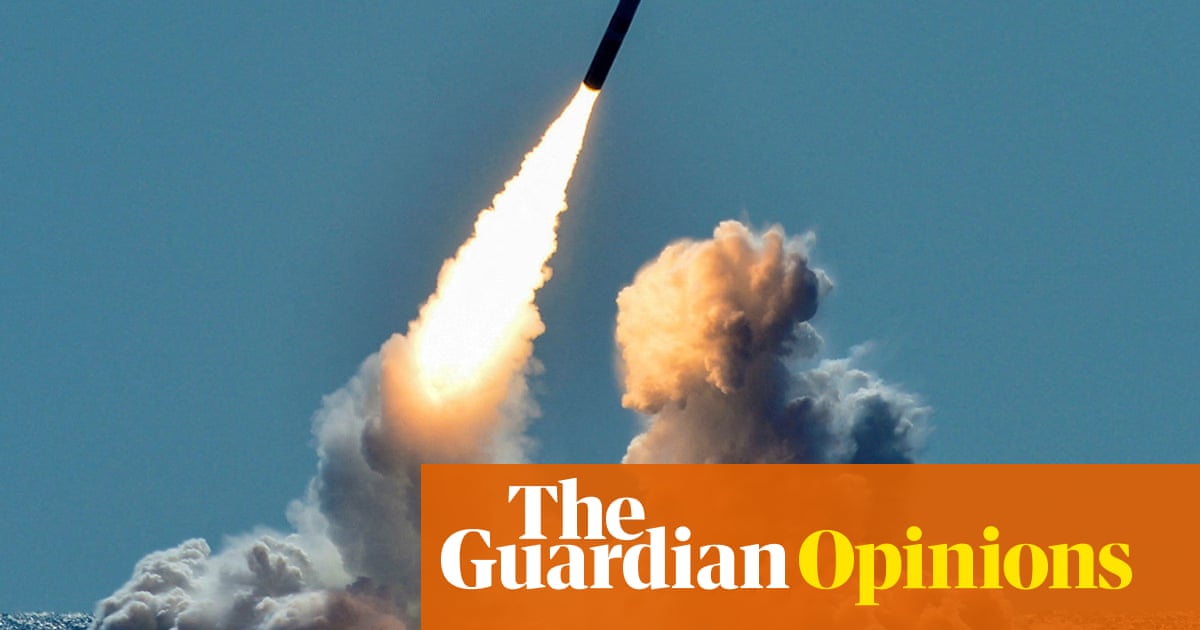Plans by Keir Starmer’s government to modernise and potentially expand Britain’s nuclear weapons arsenal, unveiled in the 2025strategic defence review (SDR), seriously undermine international non-proliferation efforts. They will fuel a global nuclear arms race led by the US, China and Russia. And they increase the chances that lower-yield, so-called tactical nukes will be deployed and detonated in conflict zones.
This dangerous path leads in one direction only: towards thenormalisation of nuclear warfare.
These unconscionable proposals are a far cry from the days when Robin Cook, Labour’s foreign secretary from 1997 to 2001,championed unilateral nuclear disarmamentand helped scrap the UK’s airdropped gravity bombs. They are a continuation of a redundant, inhuman, immoral, potentially international law-breaking deterrence policy thatcash-strapped Britain can ill afford, will struggle to implement at cost and on time, and which perpetuates illusions about its global power status.
Starmer’s justification for spending an additional £15bn on nuclear warheads for four as yet un-built Dreadnought-class submarines, whose price tag is £41bn and rising, is that the world – and the threat – has changed. But in terms of nuclear arms, it really hasn’t. Even as cold war tensions receded, the eight other known nuclear-weapons states – the US, Russia, China, France, India, Pakistan, North Korea and Israel – clung on to their arsenals. Some expanded them.
Today, as the global security environment deteriorates again, governments that ignored an obligation to pursue nuclear disarmament “in good faith” under article six of the 1970non-proliferation treaty(NPT) are finding new reasons to keep on doing so. Britain must not compound its decades-long failure to honour the spirit of the treaty. The SDR’s assertion that“continued UK leadership within the NPT is imperative”seems disingenuous, given government intentions.
The SDR concedes the NPT, up for review next year, is close to failing. “Historical structures for maintaining strategic stability and reducing nuclear risks have not kept pace with the evolving security picture,” it says. “With New Start [the 2010 US-Russia strategic arms reduction treaty] set to expire in February 2026, thefuture of strategic arms control– at least in the medium term – does not look promising.”
This is a Trident missile-sized understatement. Nuclear proliferation is once again a huge problem. The US will spend an estimated $2tn over 30 years on weapons development.Donald Trump said in Februaryhe wants to “denuclearise”. Guess what! He’s doing the opposite. The White House is seeking toraise the National Nuclear Security Administration’s annual weapons budgetby 29%, to $25bn, while slashing funding for the arts, sciences and foreign aid. That’s on top of several multibillion-dollar Pentagon weapons programmes.
China’s nuclear strike force hasmore than doubled in size since 2020, with some pointed at Taiwan. Russia’s expanding capabilities include anuclear-capable hypersonic missile, recentlyfired into Ukraine. And Trump’sGolden Dome planupends prior undertakings on anti-missile defence. By joining the proliferators, hypocritical Britain sends acynical signal to Iran, Saudi Arabia and others whose supposed nuclear ambitions it opposes.
One future scenario is especially chilling: the possible reintroduction by Britain of air-launched nuclear weapons for the first time since Cook scrapped them. This could involve buying US F-35A fighters and arming them withUS-designed B61-12 bombs. These bombs have variable yields and could be used tactically, against a battlefield target, a command HQ or a city. They could be launched remotely, using unmanned drones. They bring the prospect of nuclear warfare measurably closer.
Starmer is leaning heavily on the review’s claim that Russian “nuclear coercion” is the biggest menace facing the UK. Even if true, no amount of nuclear missiles and bombs may suffice if political will is lacking to directly confront Vladimir Putin by, for example, deploying Nato conventional forces to defend Ukraine and responding forcefully to hybrid attacks on Britain. Like the former US president Joe Biden, Starmer gives too much credence toMoscow’s crude threats. Putin knows that if he presses the nuclear button, it will explode in his face. He’s many things – but not suicidal.
This is the conundrum at the heart of nuclear deterrence theory. Nuking a nuclear-armed adversary guarantees self-destruction (which is whyIndia and Pakistan jibbed at all-out warlast month). And hurling nuclear threats at states and foes that lack nuclear weapons is ineffective. As Ukraine shows, they grow more defiant. As a weapon, nuclear blackmail is overrated. Fear of British nukes did not deter Argentina’s 1982 Falklands invasion. Nukes did not stop al-Qaida in 2001 or Hamas in 2023. So why have nukes at all?
Retaining nuclear weapons at current or increased levelsdoes not make Britain safer. Their use would be immoral, irrational and catastrophic. They are grossly expensive, consuming resources that the UK, facing painful Treasury cuts again this week, could more sensibly use to build hospitals and schools and properly equip its armed forces.
It’suncertain how independentof the US the British deterrent really is in practice. Does Starmer or Trump have the final word on use?Official secrecy prevents adequate democratic scrutiny. And the idea that nuclear warfare, once the taboo is broken, might somehow be contained or limited is a fast-track ticket to oblivion. Gradual disarmament, not rearmament, is the only way to escape this nightmare.
The SDR urges a government PR campaign to convince the British people of the “necessity” of a nuclear arsenal. No thanks. As Russia againraises nuclear war fears, what’s needed is public education about the dangers of weapons proliferation. People worry about everything from an existential global climate emergency to the cost of living. But what we’re discussing here is the universal cost of dying.
Nuclear warfare is the most immediate threat to life on earth. Worry about that first. It’s a shortcut to apocalypse – now.
Simon Tisdall is a Guardian foreign affairs commentator
